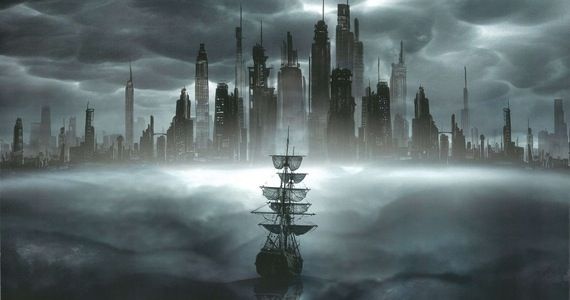With the release of Cloud Atlas this week and trailers for Life of Pi appearing all over the place, it's time to finally say goodbye to an idea that has haunted cinema since its very inception: The notion that there is such a thing as an "unfilmable book."
To be fair, the "unfilmable book" idea has always been flawed; ever since the invention of cinema, any book has been as "filmable" as any other, it's simply that some would have been more challenging and less believable to try and translate from one medium into the other. Looking at the trailer for Life of Pi, that is reinforced pretty heavily; there are shots and moments that almost declare that this movie would be impossible in an era without computer generated imagery, because how else could things like the leaping whale have been portrayed convincingly (or even unconvincingly)?
But nowadays, I feel as if almost any visual spectacle that can be written can be (relatively) effectively recreated on screen, thanks to the wonders of technology, which removes one of the final barriers to "unfilmable" books becoming movies. With enough money and the right visual effects designers - not to mention, a willing audience - almost anything is possible for filmmakers these days, and the only limits left appear to be imagination and suspension of disbelief. If someone can put it on paper, a team of other someones can put it - or a reasonable simulation of it - on screen.
What's left, then, is the question of not whether a book "is" flammable, but whether or not it should be filmed. This is the real issue behind most people's ideas of "unfilmable" books: That there's something in the novel's format that wouldn't translate well into movies, for whatever reason. This is true of many, many great books, and in many cases what makes the books great is what makes them unlikely candidates for successful translation into movies: Their use of dialogue, their narrative structure (Whether or not there is first person narration, which is harder to do in movies - especially if the narrator isn't an entirely reliable source of information - or something similar, for example), just the sheer beauty of the language being used, whatever it may be. Ultimately, I think, what makes a book into a good movie is the strength of its basic plot; that is what translates most easily, and most clearly between the two media.
Not every book would make a good movie, nor should it - The idea that all stories should work irrespective of medium is a depressingly reductive one; why not have stories that only work in the medium they were created for, as celebrations of that medium? - but the idea that those make them "unfilmable" books is a misguided one that misses the point and, oddly, casts the idea of failure upon those works in some way. Instead of complaining that some books are unfilmable, why not concentrate on why those that are more easily turned into movies - or should be - are so receptive to translation across media?

